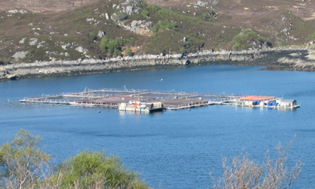 Scotland’s salmon farming industry and wild fish organisations have agreed to enter a facilitated discussion process to support the development of a positive way ahead for both sectors.
Scotland’s salmon farming industry and wild fish organisations have agreed to enter a facilitated discussion process to support the development of a positive way ahead for both sectors.
Environment Minister Stewart Stevenson said:
“Scotland is blessed with some of the best salmon fishing rivers in the world and has an international reputation that draws visitors from near and far. We are also known for producing premium quality farmed salmon, and the aquaculture industry makes a key economic contribution, particularly in fragile rural communities.
“I believe that both sectors can exist and develop in harmony with each other, and I am therefore greatly encouraged that both wild fish interests and the salmon farming industry have agreed to this new process with a view to working together more constructively in the future.”
Dr Alan Wells, Policy and Planning Director of the Association of Salmon Fishery Boards said:
“We recognise that the salmon farming industry makes an important contribution to Scotland’s rural economy and that it is here to stay. However, wild salmon and sea trout are also important to the west Highlands and Islands.
“Accordingly we welcome the intervention of Stewart Stevenson to encourage both wild fish interests and aquaculture interests to enter discussions with a view to working together more constructively in the future, and enabling both sectors to prosper”.
Scott Landsburgh, Chief Executive of the Scottish Salmon Producers’ Organisation, which represents the salmon farming industry, said:
“We are pleased that the Minister has taken a lead in establishing these discussions. We welcome the recognition by all parties in the process that salmon farming plays a vital part in Scotland’s rural economy and has a long term future. We look forward to joining with our colleagues in the wild fisheries sector in these discussions.”
Paul Knight, Chief Executive Officer of the Salmon and Trout Association, said:
“We too welcome this initiative from the Minister and we intend to work to constructively to enable Scotland’s iconic wild fisheries to prosper alongside a successful fish farming industry.”
Andrew Wallace, Chairman of the Rivers and Fisheries Trusts of Scotland, added:
“For the past decade we have engaged in dialogue on many levels with the salmon farming industry and this fresh initiative is certainly worth exploring.”
Phil Thomas, Chairman of the Scottish Salmon Producers’ Organisation, said:
“These discussions offer Scotland’s aquaculture and wild fisheries sectors a valuable opportunity to build constructive dialogue going forward.”
Background
The parties will have an opportunity to meet with an independent facilitator shortly to discuss how the process might work and what outcomes should be sought.
Aquaculture accounts for almost 40 per cent of the value of Scotland’s food exports, with production worth around £434 million per year. Alongside Norway and Chile, Scotland is a top three global producer of farmed Atlantic Salmon.
Figures for 2010 show that Scotland’s total rod catch for salmon was the highest on record, with 110,496 salmon and grilse caught, up 31 per cent on the previous five year average. Of these 70 per cent were caught and released by anglers (rising to 86 per cent for spring salmon).
Game and coarse angling brings in over £113m annually to the Scottish economy and helps sustain over 2800 jobs around Scotland. Salmon and sea trout angling in Scotland accounts for more than 500,000 angler days.
